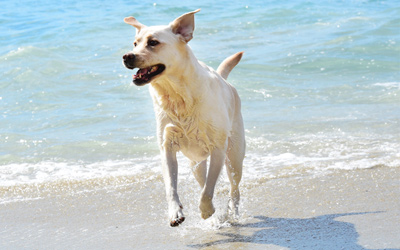
The official start to the summer is upon us and this “fun in the sun” season also happens to bring with it some hazards – especially for our pets. To make sure your pet’s summer season is as fun and safe as possible, North Shore Animal League America would like to share these important Summer Pet Safety Tips:
Never leave your pet in a car! Parking in the shade and leaving the windows open is not an option. Even if you are just running a quick errand, in a hot car your pet’s temperature can rise rapidly and they can overheat in a very short period of time. It only takes minutes to reach dangerous levels leading to heatstroke and even death.
Always make sure your pet has cool, clean water available. This is one of the easiest ways to avoid heat injuries in the summer months. Dogs, and even cats, drink more on hot days, and water warms up quickly, so make sure to change your pet’s water often.
Food and drinks you serve your family and friends may be poisonous to your pets.Backyard BBQs and pool parties are what we all look forward to during the summer, but keep an eye on what your pet is eating when you get the party started. Dogs and cats can experience severe digestive ailments when a change of diet takes place. The following products are extremely poisonous to pets: raisins, grapes, onions, chocolate and products with the sweetener, xylitol.
Do not walk your dog near fireworks. Besides the obvious danger, the loud noise can be very scary.
Do not force your dog into the water if he/she is frightened. Some dogs do not like to swim. If your dog likes to swim, do not leave him/her unattended. Bathe your dog afterwards to remove all sand, mud, and chlorine. Also, be sure all pool chemicals are stored safely out of reach.
Do not allow your dog to hang out of the window of a moving car. Objects such as rocks or tree limbs could seriously injure your pet, or he/she might fall or jump out.
Do not allow your animals to ride in the back of a pick-up truck. They could be thrown out, or they may jump out.
Take your pets inside if there is the possibility of a thunderstorm. Loud thunder may frighten them, or lightening could strike them.
Have your pet checked for heartworm. Though commonly found in dogs, heartworm can affect cats, too. Heartworm disease is more commonly seen in warmer weather. Easily transmitted through insect bites and/or contact with another infected animal, this disease inhibits proper pumping and functioning of the heart muscle, and may cause heart failure if not treated. Have your pet checked and administer a heartworm preventative.
Check your pet daily for fleas and ticks. It is important to apply flea and tick prevention to your pet monthly or as indicated on the specific product label of the product that is used. Fleas and ticks can cause anemia, carry other harmful parasites, as well as carry other diseases such as Lyme Disease. There are several options available for flea and tick prevention. Ask your veterinarian which product addresses the specific needs of your pet given its individual environment.
If your pet likes to relax in the shade of a yard or deck, watch out for yellow jackets, bees, toads, and snakes. Bite or sting symptoms are usually swelling of the face or affected areas. Once stung or bitten, the pet’s skin may start to look wrinkly or bumpy. This is a first indicator and, if not treated by a veterinarian, could result in death due to toxins taking over and shutting down the animal’s body or causing air way swelling and suffocation.
Your pet CAN get sunburn. This is more likely in white dogs, hairless dogs, and dogs with light colored fur, such as Pit Bulls and Dalmatians. If you have a pet that meets this criteria, it is recommended that you apply sunscreen to your pet before it is allowed to be outside for an extended period of time.
Keep your dog’s paws cool at all times. Limit the time you let your dog roam in the backyard and outdoors, especially on hot asphalt. Since the ground heats up quickly during the summertime, your dog’s body heat can rapidly rise, and sensitive paw pads can get burned.
Know the signs of heat stress. In these warm summer months it is best to be aware of the signs of heat stress by exposure to extreme temperatures. Check the animal for signs of heavy panting, glazed eyes, a rapid heartbeat, restlessness, excessive thirst, lethargy, fever, dizziness, lack of coordination, profuse salivation, vomiting, a deep red or purple tongue, and unconsciousness.
If Your Pet Is Overheating
- Move your pet into the shade or an air-conditioned area.
- Apply ice packs or cold towels to your pet’s head, neck and chest or immerse him in cool (not cold) water.
- Let your pet drink small amounts of cool water or lick ice cubes.
- Take your pet directly to a veterinarian.



